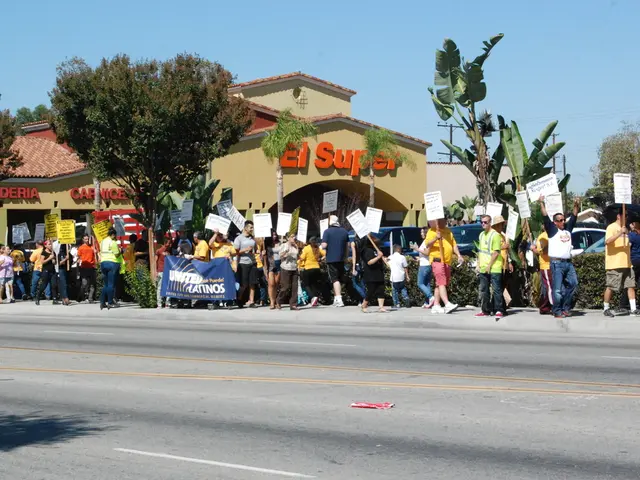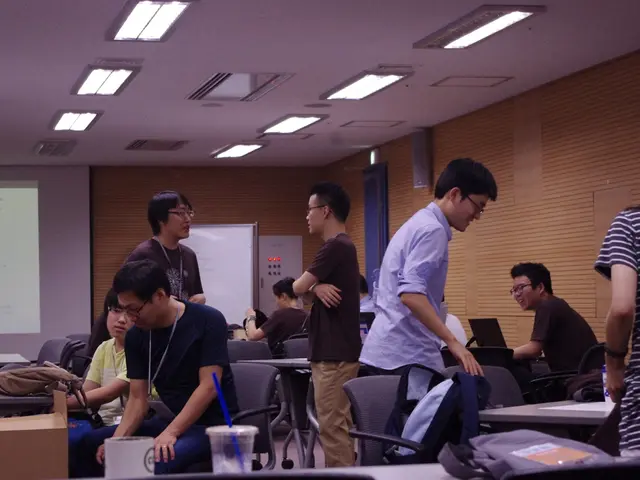Wine estates in New York's viniculture region prioritize eco-friendliness while adapting to shifting climate conditions.
In the picturesque Finger Lakes region of New York, where over 130 wineries dot the shorelines of sparkling, sapphire-hued lakes, the wine industry is facing a number of challenges. Scott Osborn, owner of the sprawling Fox Run Vineyards, once encouraged others to join the industry, but his message has significantly changed.
"You're crazy," Osborn bluntly states. Climate change and unpredictable weather are making it increasingly risky for growers like him to cultivate grapes. The once predictable cycle of the plants' buds breaking out in spring and emerging with colorful grapes is becoming less reliable, adding to uncertainty and potential risks.
Despite the challenges, many winegrowers are choosing to embrace sustainable practices in the hopes of adapting to changing times. They recognize their role in contributing to global warming caused by the burning of fuels like gasoline, coal, and natural gas. Certified initiatives like the New York Sustainable Winegrowing program require growers to improve practices such as bettering soil health and protecting water quality.
Local winemakers have developed a competitive advantage by learning to adapt to the region's unique climate, characterized by year-round rain and warmer night temperatures. However, these conditions can also exacerbate problems like frost damage and grape diseases. Sustainability initiatives, such as the use of solar panels to power the farm and underground networks of fungi to insulate crops, are essential in the fight against climate change.
However, the industry faces other challenges too. The political climate, with President Trump's trade wars resulting in tariffs and the administration's rollback of environmental policies, leaves winegrowers feeling anxious and unsure.
Take Suzanne Hunt, for example. She runs Hunt Country Vineyards, a family-owned vineyard along Keuka Lake. Devastating frosts in recent years have caused catastrophic crop loss, and changing consumer attitudes, as US wine consumption has decreased, force tough decisions upon Hunt. By the end of this year, the vineyard will stop producing wine and shift its focus toward community workshops and the sale of certain grape varieties.
Other wineries are taking action to address these concerns. For example, Billsboro Winery has established communal wine bottle dumpsters to reduce waste and reuse glass for construction materials. Yet, owner Vinny Aliperti laments that more wineries aren't doing enough to address sustainability issues. The industry's long-term viability depends on it, especially under a presidential administration that seems disinterested in sustainability, he argues.
The challenges facing the wine industry during these troubling times are significant, but it's clear that many winegrowers in the Finger Lakes are determined to adapt and thrive. Perhaps that's what kept Aric Bryant, a decade-long patron at Fox Run, loyal despite the adversity. "I have this, like, fierce loyalty," he says. "I support New York wines, no matter what."
- Scott Osborn, confronting the unpredictable weather and climate change impacts, now urges caution to those contemplating joining the vineyard industry in the Finger Lakes region.
- With the changing climate, once reliable budding cycles of grapes for wineries like Fox Run Vineyards are becoming less predictable, introducing more uncertainty and risks.
- To adapt to the changing times, winemakers are turning to sustainable practices, acknowledging their contribution to global warming from burning fossil fuels.
- The New York Sustainable Winegrowing program, mandating improved soil health and water quality protection, represents a certified initiative embraced by local winemakers.
- Wine industry operators recognize the unique climate challenges posed by year-round rain and warmer night temperatures, which can aggravate issues like frost damage and grape diseases.
- Sustainable practices, like the use of solar panels for power and underground fungi networks to insulate crops, are crucial in the fight against climate change for wineries in the Finger Lakes.
- The industry, however, faces external challenges as well, with President Trump's trade wars and the administration's rollback of environmental policies leading to feelings of anxiety and uncertainty among winegrowers.
- Suzy Hunt, vineyard owner at Hunt Country Vineyards, struggles with devastating frosts and changing consumer attitudes, ultimately deciding to stop wine production and focus on sales and community workshops.
- Billsboro Winery has taken action by implementing communal wine bottle dumpsters to minimize waste and reuse glass for construction materials, yet Vinny Aliperti wishes more wineries would prioritize sustainability initiatives for the industry's long-term viability.
- Faced with these challenges, ardent supporters like Aric Bryant, a long-time patron of Fox Run Vineyards, maintain their loyalty to New York wines despite the adversity, mirroring determination among local winemakers to adapt and thrive.








